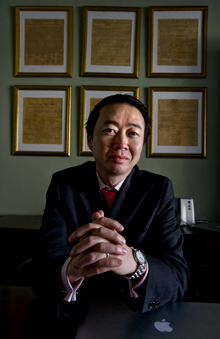New Degree Makes Masters of Disasters
“I'm happy to say we have this program,” says Ky Luu, and happy as well are potential students from Bangladesh, Somalia and Pakistan, as well as those already at Tulane who are interested in Tulane's new master's degree program in disaster resilience leadership studies.

Ky Luu and his team with the Disaster Resilience Leadership Academy at Tulane will launch their new master of science program this fall. (Photo by Paula Burch-Celentano)
After offering certificate programs for more than a year, the Disaster Resilience Leadership Academy has now won approval from the Tulane Graduate Council to offer the new master of science degree.
“It has generated excitement across the board,” says Luu, executive director of DRLA. He and his team will welcome the first class of 20 to 30 students this fall. The 36-credit program is offered through the Payson Center for International Development of Tulane Law School.
Luu came to Tulane in August 2009 from the Office of U.S.Foreign Disaster Assistance to build DRLA and develop leaders skilled in disaster response, promote research and stimulate global innovation in the disaster resilience and humanitarian assistance community. According to Luu, the needs are great the United Nations reports that five times more people are now affected by disasters than a generation ago.
“Students need to understand that disasters have no boundaries,” he says. “What's unique about this program, it's appealing to both international and domestic students.”
Last semester, Luu taught one of the core courses that DRLA already is offering that can be rolled into the master's program. Students in his class, Disaster Operations Leadership Management and Policy, divided into teams to help four nonprofit organizations analyze their business risks and vulnerability.
This semester, two courses are being offered: Psychosocial Leader Analytics, taught by Charles Figley, social work professor and co-director of DRLA, and Environmental and Hazards Science, with Douglas Meffert, deputy director of the Tulane/Xavier Center for Bioenvironmental Research.
Students “see the value added in these courses and the focus on leadership,” Luu says. He hopes to build on that “added value” with a future Ph.D. program.
